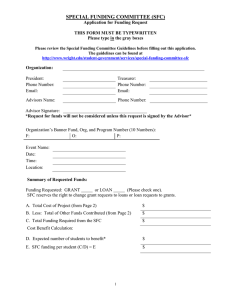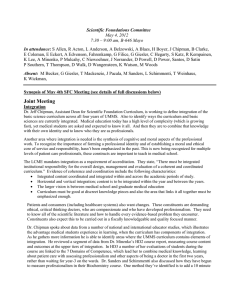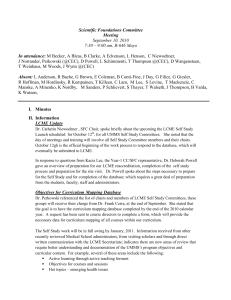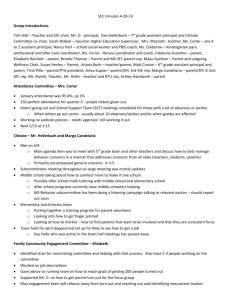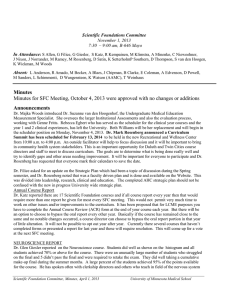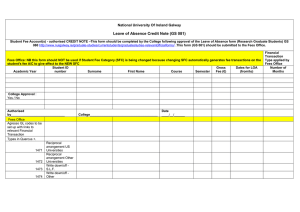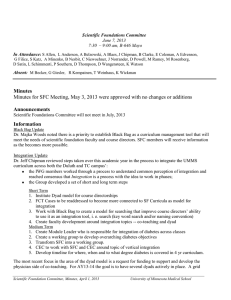C Hegarty, S Katz, A Minenko, C Niewoehner, J... P Southern, D Wangensteen, K Watson, T Weinhaus, M Woods
advertisement
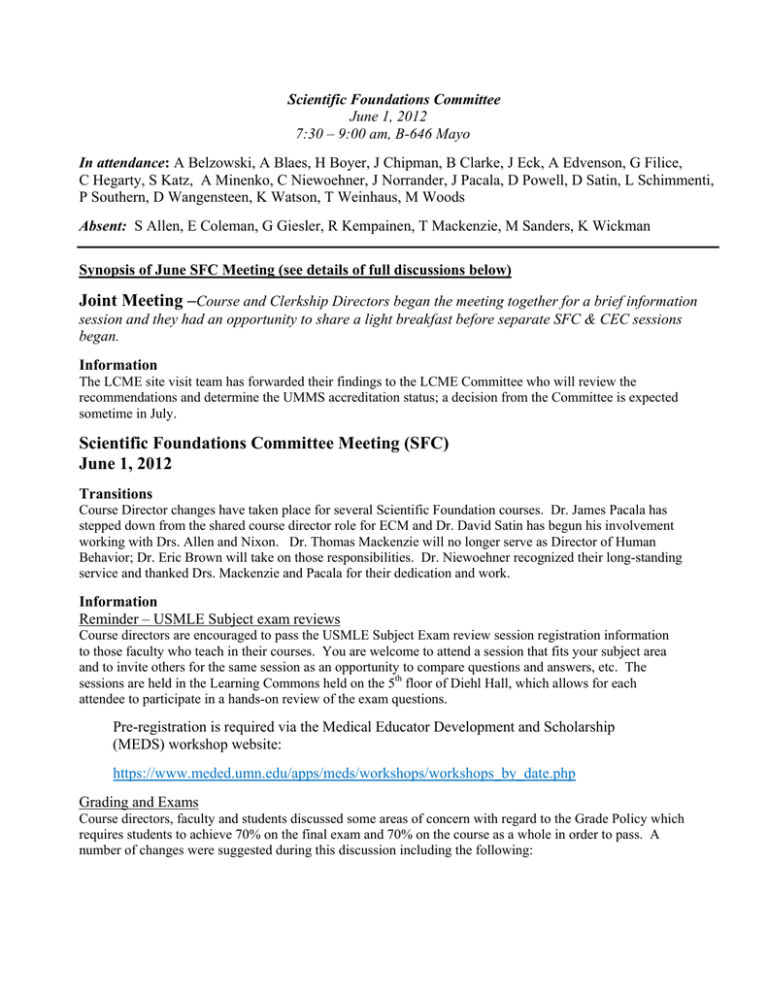
Scientific Foundations Committee June 1, 2012 7:30 – 9:00 am, B-646 Mayo In attendance: A Belzowski, A Blaes, H Boyer, J Chipman, B Clarke, J Eck, A Edvenson, G Filice, C Hegarty, S Katz, A Minenko, C Niewoehner, J Norrander, J Pacala, D Powell, D Satin, L Schimmenti, P Southern, D Wangensteen, K Watson, T Weinhaus, M Woods Absent: S Allen, E Coleman, G Giesler, R Kempainen, T Mackenzie, M Sanders, K Wickman Synopsis of June SFC Meeting (see details of full discussions below) Joint Meeting –Course and Clerkship Directors began the meeting together for a brief information session and they had an opportunity to share a light breakfast before separate SFC & CEC sessions began. Information The LCME site visit team has forwarded their findings to the LCME Committee who will review the recommendations and determine the UMMS accreditation status; a decision from the Committee is expected sometime in July. Scientific Foundations Committee Meeting (SFC) June 1, 2012 Transitions Course Director changes have taken place for several Scientific Foundation courses. Dr. James Pacala has stepped down from the shared course director role for ECM and Dr. David Satin has begun his involvement working with Drs. Allen and Nixon. Dr. Thomas Mackenzie will no longer serve as Director of Human Behavior; Dr. Eric Brown will take on those responsibilities. Dr. Niewoehner recognized their long-standing service and thanked Drs. Mackenzie and Pacala for their dedication and work. Information Reminder – USMLE Subject exam reviews Course directors are encouraged to pass the USMLE Subject Exam review session registration information to those faculty who teach in their courses. You are welcome to attend a session that fits your subject area and to invite others for the same session as an opportunity to compare questions and answers, etc. The sessions are held in the Learning Commons held on the 5th floor of Diehl Hall, which allows for each attendee to participate in a hands-on review of the exam questions. Pre-registration is required via the Medical Educator Development and Scholarship (MEDS) workshop website: https://www.meded.umn.edu/apps/meds/workshops/workshops_by_date.php Grading and Exams Course directors, faculty and students discussed some areas of concern with regard to the Grade Policy which requires students to achieve 70% on the final exam and 70% on the course as a whole in order to pass. A number of changes were suggested during this discussion including the following: delay of exam requests -- how to determine when extenuating circumstances exist, proper and productive information sharing with students, course directors, Med Ed administration and faculty advisors o student completes form to request delay of exam (B Clarke) o Clarke consults with course director o Med Ed administration review o Faculty Advisor input sought how to balance between students who need delays and when delays should be denied how to aid students requesting delays in bringing them along in their academic performance how to weigh students with extenuating conditions with ability to continue to perform well and others who require added time emergency events that occur at the last minute Suggestions for additional consideration: complying with deadlines (exams) while balancing other stressors are learning experiences in preparation for practicing medicine individual’s faculty advisor should be a contributing source in delay of exams bring Policy back to EC for discussion of issues and concerns, request Policy be revisited o request review of concerns by ESC o MED ED, with input from CEC & SFC, manages policy review What level of importance does 1 “n” on transcript represent o limits ability to select competitive specialty residency programs o residency programs see it as a risk for failure on the part of the student, large number of applicants with 0 failures o residency program directors review applications with an eye to who will have problems when stress of residency training is it peak. In this process “n” becomes a red flag Tracking student progress Jill Eck, Director Student Support, spoke about concerns with tracking student progress and identifying students who are struggling. She and Dr. Lil Repesh, Associate Dean for Student Affairs – Duluth, are working to develop an early alert system with steps to consistently review student progress. The process would be in place for faculty and course directors to consider taking when they see a student(s) struggling with any aspect of a course. Early identification of a variety of issues, which affect students’ performance and put them at risk of failure, is important. Students report that the 70% score required on both the final exam and the course overall has caused a great deal of stress for many students. There will be a larger discussion on exams and grades during the August SFC meeting. Details of this discussion can be found in the Addendum to the June 1, 2012 SFC Minutes Best Practices Dr. Niewoehner thanked Dr. James Pacala for his leadership in setting a standard of excellence in the teaching he has done over a twenty year period. He has taught numerous courses and made innovative changes in a number of them. He received an Apple Award in recognition of his contribution to medical education at UMMS. Dr. Pacala noted that he has served as a course director for 14 of the 20 years he has been teaching. He feels it’s time for new ideas and for others to take charge of directing courses. He will be more involved in the workings of the Department of Family Medicine and its administrative functions. Initially he will take a sabbatical leave for Fall 2012 to work on a National Health and Aging Fellowship. Currently he serves as president of the American Geriatrics Society and will use the opportunity to contribute in that role and to stay close to medical education activities. If selected for the fellowship he will work with staff at AAMC and Medicare, in Washington, D.C., the topic he has chosen is “reform of Medicare funding of GME”. Dr. Pacala will continue to direct one of the Primary Care Selectives along with his new duties. In speaking about the importance of the role of teaching, in his experience with teaching both pre-clinical and clinical courses; the basic sciences courses are the more challenging to teach. He commented on the importance of three areas that create challenge for faculty. First, spending the time to assure AV and technology use in the classroom (small and large classes) will be accomplished seamlessly. Secondly, developing skills to engage students each and every time they are in a classroom setting, providing added value for students when they attend the class in person. This is a factor in relation to on-line course offerings being piloted by schools such as Stanford and others. Third is assessment of student performance, which requires individual effort on the part of the course director to apply good assessment measures to understand how well students are able to achieve the goals and objectives of the course. He uses open book assessments, for which all questions require essay answers. Distribution of his time over the years of teaching has shifted to spending more time on assessment; deciding what is to be measured by each question, writing exam questions, and grading exams. He feels strongly in the future more time will be spent on assessment relative to time spent on delivery of information. Details of this discussion can be found in the Addendum to the June 1, 2012 SFC Minutes Annual Course Report (ACR) Human Disease 4 HD-4 is essentially Blood and Gut (in addition with pathology, pharmacology, lab medicine and a fair amount of ID topics). Highlights of the course for how is it determined the students are achieving the goals and objectives of the course. There were 3 students who didn’t pass the exam this year and all students passed the course portion of Blood and Gut. Prior to going to the 70% requirement all students passed, but both last year and this year 3 students have failed. Another indicator is the Step I, for the Blood portion and Blood Path, students achieve much higher on the national average. The GI portion continues to be a work in progress, on Step I students are achieving much more average scores. The sense is that they are well prepared for the wards, but this is harder to assess. Working Well The small groups are outstanding; there are a number of highly regarded teachers from here, Regions and Minneapolis Children’s that teach in this course. The small groups are interactive and are well received. For the current year quizzes for small groups to add more interaction part of the small group setting. If students come in unprepared for small group sessions it’s difficult to develop interactivity in a course. This year the students were much more engaged and participating at a higher level than the first year. Areas of Concern Space was an issue for small groups; some rooms were too small and at other times a small group would take place in a large lecture hall, changing the small group dynamic a great deal. The assigned rooms are reviewed at the beginning each year to determine if they’ll work and if not changes are requested, but this year because of the LCME site visit that wasn’t possible. The first week of the course, students register for their clinical rotations and this causes disruption. There has been improvement because registration is now done after school hours in the 1st week of school, but many students are so involved in the registration process before their registration happens that they do not remember any of what is covered in that first week of a 5-week course. The bulk of GI is covered in this first week and students perform more poorly on assessment questions for GI. She doesn’t have ideas for how to improve the situations but is open to any suggestions. There are still challenges with faculty who lecture without knowing what is going on in the rest of the course. Dr. Blaes has met 1:1 with a large number of faculty who teach Blood lectures, achieving significant progress in that area. GI lectures continue to be less integrated with the rest of the course; she will make a strong effort to have 1:1 meetings with GI faculty for next year. Changes Plans for next year include efforts to find reading sources that better fit the student needs and more clearly help to define the big picture to tie together how the gut/organs are interrelated. Students struggle to determine what is important in the readings they are assigned. They also need a better understanding of the goal of the pre-small group quizzes; students feel they are being tested on materials they haven’t had previous to the quiz. Quizzes are designed to help them note whether they’ve attended lectures, completed readings and/or prepared for small group sessions. Strengthen working relationships with GI and GI pathology in order to provide a more cohesive approach to the material overall. Additional details of this discussion can be found in the Addendum to the June 1, 2012 SFC Minutes No SFC or CEC Meeting will be held in July Next Meeting, August 3, 2012
